Deploy Arabic AI Agents for Customer Support with Confidence

Preetam Das
August 22, 2025
9 min
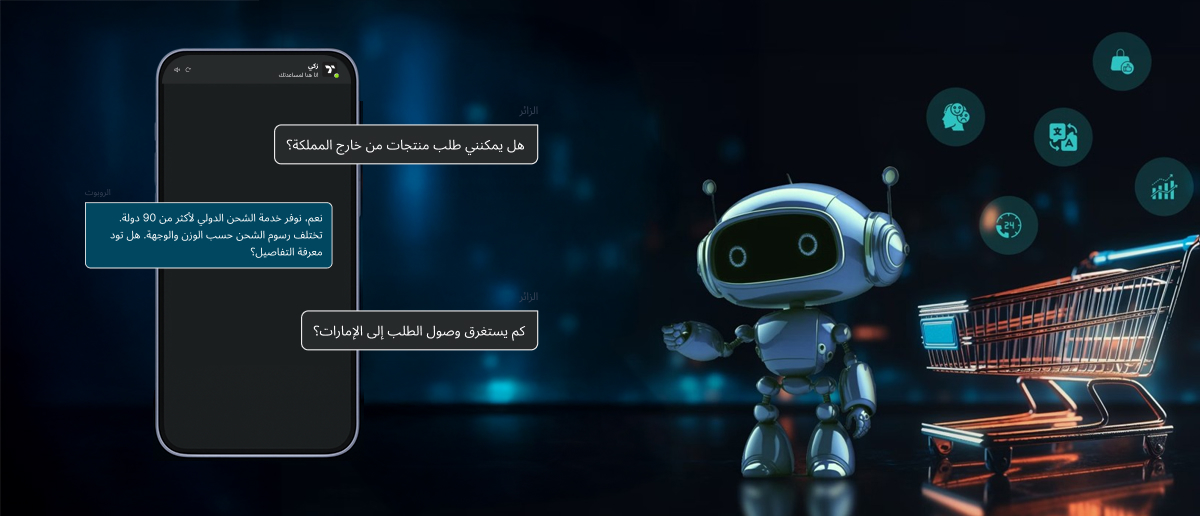
Table of Contents
By 2027, the United Arab Emirates (UAE) aims to become the world’s first fully AI-native government, embedding AI agents and automation technologies into every layer of public interaction from service delivery to internal operations.
AI is projected to contribute $96 billion to the UAE economy by 2031, while the broader MENA AI market is expected to generate over $320 billion in gains.
Over 200 public services are being redesigned to run through conversational AI and AI virtual assistants, delivering seamless, responsive, and intelligent interactions between the state and its citizens.
The goal is to maximize operational efficiency by cutting costs, reducing friction, and freeing up human talent for complex, high-value work.
But despite this momentum, one major obstacle remains the Arabic language itself.
With its vast dialectal diversity, layered morphology, and absence of standardised linguistic datasets, Arabic is one of the toughest environments for AI chatbots to operate in.
Tools built for English or other widely supported languages struggle to adapt. Even the most advanced large language models like ChatGPT or Gemini are trained primarily on English corpora and lack deep Arabic language comprehension.
As a result, AI and NLP in Arabic remain in relatively early stages of maturity.
The gap is most visible in customer service. Tone, context, and clarity are critical, but current systems often fall short. When customer support lacks accuracy and natural flow, it impacts user satisfaction and erodes trust.
Foundational Technologies for Arabic AI Agents
Building effective Arabic AI agent customer support systems demands a full stack of technologies built around the unique challenges of the Arabic language.
AI agents go beyond AI chatbots. While chatbots rely on predefined scripts or trained responses, AI agents are autonomous systems that combine language understanding, reasoning, memory, and tool calling to complete multi-step tasks.
They can gather information, interact with external systems, escalate when needed, and make decisions within set boundaries.
At their core, AI agents are built on NLP, large language models (LLMs), and machine learning, which together enable understanding, reasoning, and fluent response generation.
For Arabic customer support, these foundations must be adapted to the region’s linguistic and cultural complexity to ensure accuracy and trust.
Core Components of AI Agents
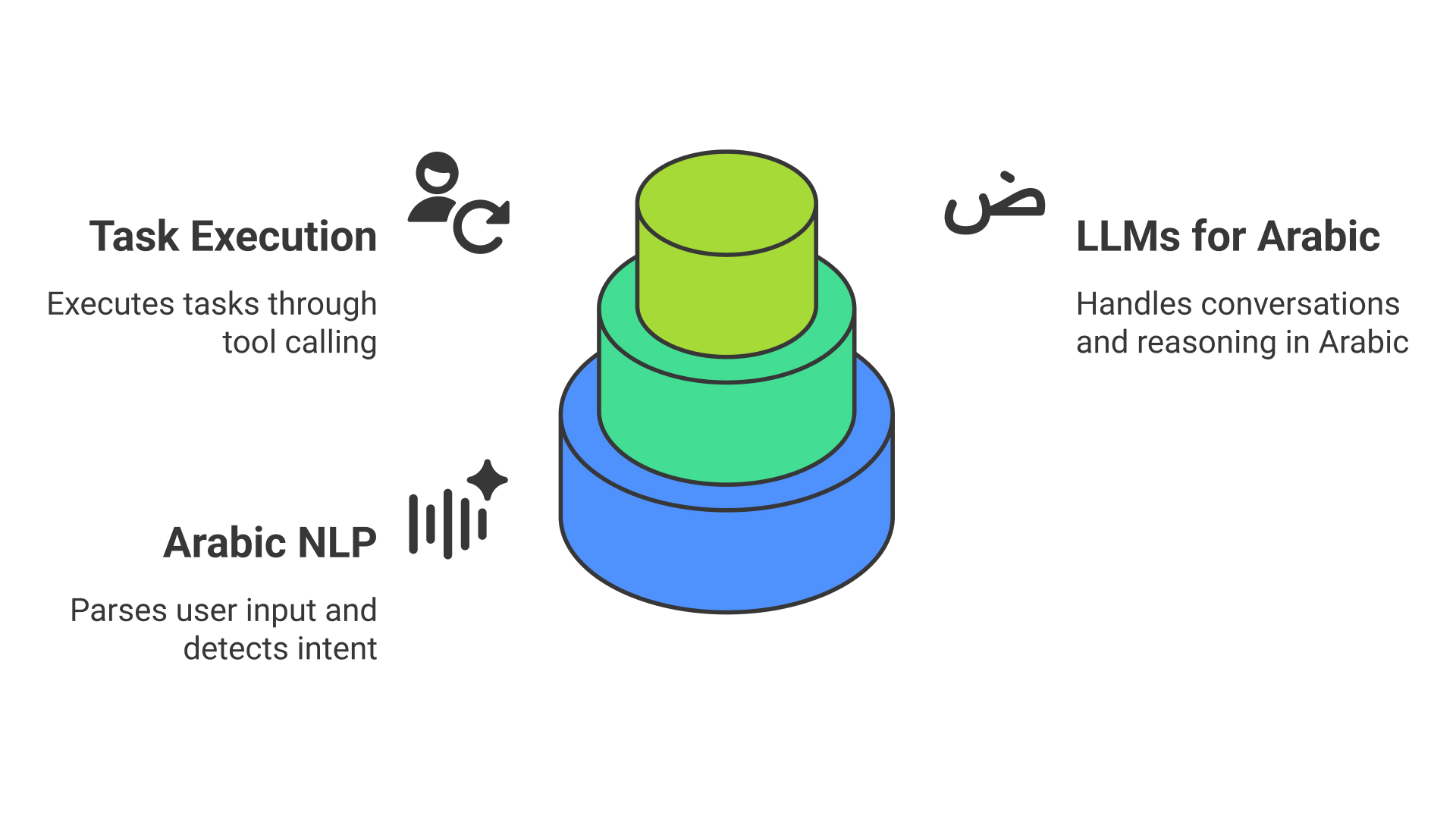
Arabic Language Understanding (NLP)
Natural Language Processing (NLP) is the foundation of AI agents, enabling them to parse user input, detect intent, and transform sentences into machine-readable structures.
In Arabic, however, this layer becomes significantly more complex. Words are derived from roots that generate many variations; diacritics that alter meaning are often omitted in writing, and Modern Standard Arabic coexists with dozens of dialects that differ in vocabulary, syntax, and pronunciation.
To manage these realities, Arabic-specific pipelines adapt to these challenges, allowing AI agents to interpret intent accurately even in informal or mixed-language contexts.
Large Language Models (LLMs) Adapted for Arabic
Large Language Models (LLMs) give AI agents the ability to handle conversations and reasoning, producing fluent and contextually relevant responses.
The limitation is that most large models are trained mainly on English and other widely used languages, which makes them less effective in Arabic. They often miss dialectal nuances, drop context, or produce outputs that feel unnatural in tone.
This gap can be overcome by fine-tuning on Arabic data and dialects, enabling customer support agents to respond naturally, maintain context, and match cultural expectations.
Task Execution Layer
Once intent is identified, execution depends on the agent architecture, which includes a reasoning layer (planner), memory, a tool interface (API schema), and an executor with guardrails.
Agents act through tool calling, invoking APIs or functions to update CRM records, schedule appointments, generate invoices, or escalate cases. Emerging standards such as the model context protocol (MCP) make this process more reliable by defining how models connect to external tools, share context, and manage workflows across systems in a secure and consistent way.
In the Arabic context, the key challenge for task execution is ensuring that once intent is identified, it maps seamlessly into structured system actions without ambiguity. This can be addressed by combining dialect-aware intent recognition with strong schema mappings between natural language and enterprise workflows.
Key Benefits of AI Agents in Arabic Customer Support
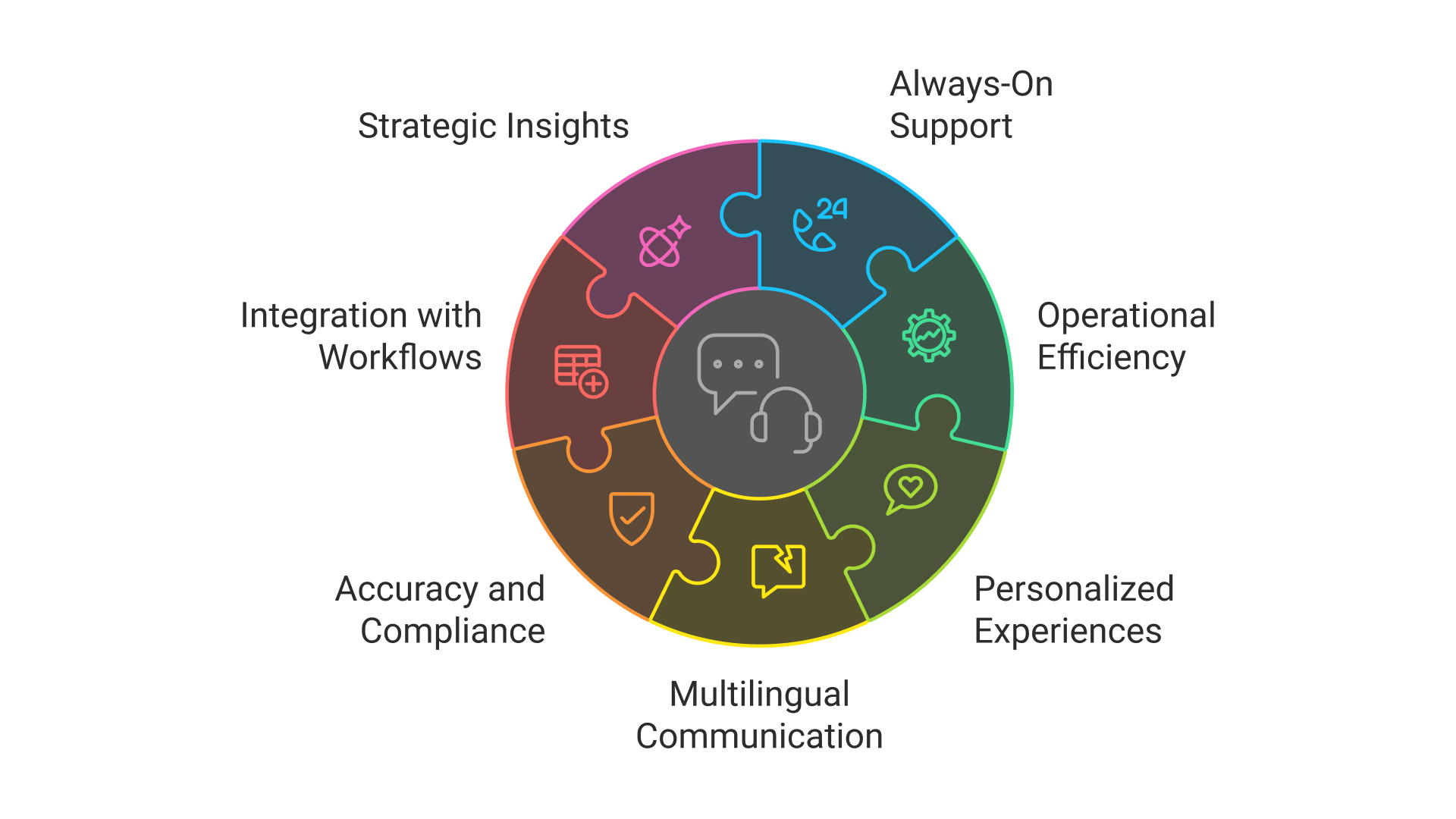
Always-On Support Across Time Zones
Unlike human teams with shift limits, AI agents maintain consistent service quality 24/7, ensuring faster resolution times and higher satisfaction without increasing operational costs. This is especially valuable in the UAE and wider GCC, where businesses serve both local and international customers across multiple time zones.
Operational Efficiency at Scale
AI agents reduce workload by automating repetitive and routine tasks. This cuts dependency on large human support teams and lowers operational costs while maintaining service levels during peak periods like holidays or sales events. AI agents provide scalability without additional staffing overhead.
Personalized and Context-Aware Experiences
AI agents use conversation history and contextual memory to tailor responses. In Arabic customer support, this means adapting to dialects, recalling past interactions, and providing recommendations that feel relevant and natural, which builds stronger trust and loyalty.
Multilingual and Dialect-Sensitive Communication
AI agents can switch between Arabic, English, Hindi, Urdu, and other languages common in the UAE. Within Arabic, they recognize and respond to dialectal variations, making interactions more accessible and inclusive.
Accuracy, Consistency, and Compliance
AI agents deliver consistent responses, reducing errors that often occur with human teams. In sectors like banking or healthcare, this ensures compliance with regulations while handling the ambiguity of Arabic phrasing and dialects more reliably.
Integration with Enterprise Workflows
AI agents can connect directly with backend systems. A customer request in Arabic can trigger updates to CRM records, payment processing, or ticket creation, reducing manual steps and speeding up resolution.
Strategic Insights from Interaction Data
AI agents improve over time by learning from past interactions. In Arabic customer support, this means they adapt to new dialectal expressions, refine intent detection, and reduce errors with every conversation.
Implementation Roadmap for Arabic AI Agents
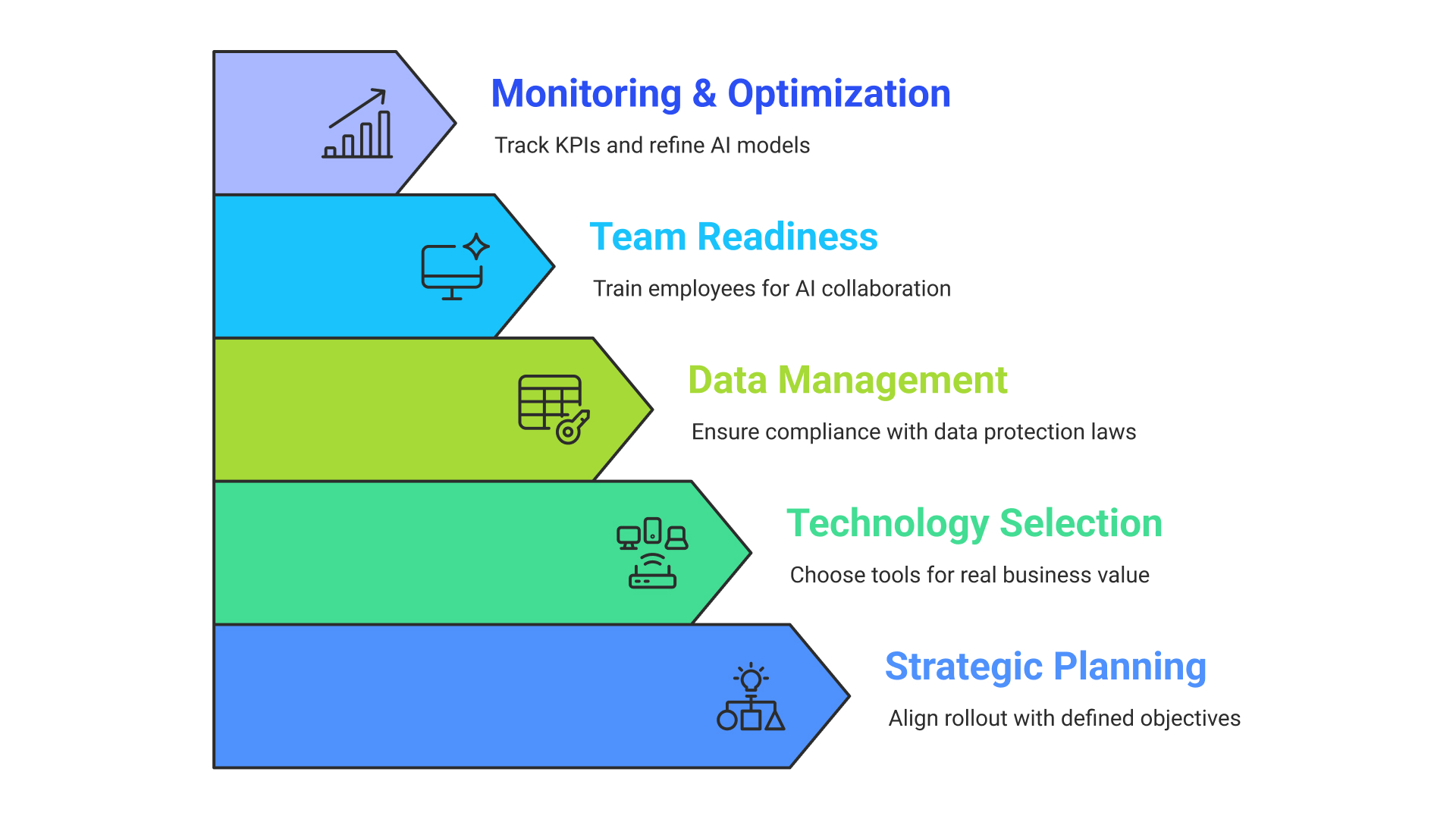
Implementing an Arabic AI agent for customer support is not a plug-and-play. It requires adapting global best practices in AI deployment to the linguistic, cultural, and regulatory realities of the UAE and wider MENA region.
Strategic Planning
Businesses should begin with a clear rollout strategy aligned to defined objectives. Rather than deploying every capability at once, focus on high-value, low-risk use cases such as automating FAQs, order tracking, or simple service requests.
Early deployments provide measurable benchmarks on accuracy, adoption, and impact against KPIs. Once validated, the program can scale to more complex scenarios, expanding into AI sales agents that support guided shopping journeys or internal AI agents that streamline HR and IT workflows.
Technology Selection
Selecting the right technology is not just a technical decision; it determines whether an Arabic AI agent delivers real business value.
- API Integration: Connects seamlessly with CRM, ERP, and marketing automation tools.
- Dialect-Rich NLP: Understands Gulf, Levantine, Egyptian, and other Arabic variations.
- Enterprise Security: Ensures compliance with regulations and protects sensitive data.
- Channel Scalability: Extends to WhatsApp for customer service and other platforms without extra overhead.
With Thinkstack, an AI agent builder, you can train agents directly on your Arabic business data for context-aware responses, handle multiple dialects like Gulf, Egyptian, and Levantine, ensure proper RTL rendering across interfaces, and integrate instantly with enterprise systems like CRM, ERP, and marketing platforms without any coding.
Data Management and Security
Businesses operating in the UAE must align with the personal data protection law and industry-specific regulations, particularly in finance and healthcare, where privacy is critical. Strong safeguards such as encryption, audit trails, and role-based access are essential to protect sensitive interactions and maintain customer trust.
Team Readiness and Change Management
Maximizing ROI from Arabic AI agents depends on how effectively employees are trained to work with them. Teams must learn when to rely on the agent for routine tasks and how to step in for escalations, ensuring smooth human-AI collaboration.
Monitoring and Optimization
Businesses should track performance against KPIs such as resolution rates, CSAT, and cost savings, while feeding customer feedback from channels like WhatsApp back into the system to refine conversational AI flows. Models need to be retrained with fresh, dialect-rich, and code-mixed data to stay aligned with real-world usage. Once stable, agents can be expanded incrementally from customer service into sales, marketing, and internal operations, ensuring consistent ROI and long-term value.
Conclusion
Arabic AI agents are becoming essential as customer expectations shift toward faster, more personalized, and dialect-aware service.
As customer behavior shifts toward digital-first, multilingual, and hyper-personalized experiences, businesses that rely solely on human teams or generic AI models risk falling behind.
The future will be defined by agentic AI capable of autonomous workflows, seamless collaboration with human teams, and industry-specific intelligence. This evolution is particularly relevant in the UAE, where government ambitions to become fully AI-native by 2027 set the pace for private sector transformation.
Launch your Arabic AI agent in just a few clicks with Thinkstack’s no-code platform. Train it instantly on your own Arabic content websites, PDFs, with full RTL support to ensure natural Arabic experiences across every channel.
Upgrade Your Customer Support Experience with Arabic AI Agents
Get started for freeFrequently Asked Questions (FAQs)
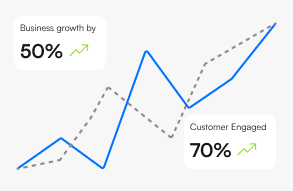
Grow Your Business with AI Agents
- Automate tasks
- Engage customers 24/7
- Boost conversions